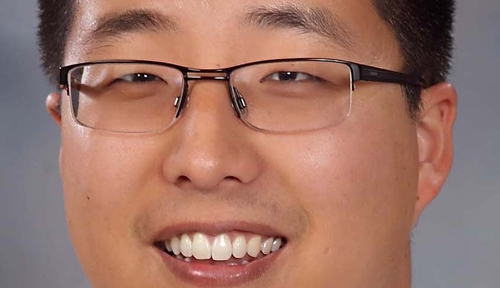There is growing evidence of a crisis in mental health issues among undergraduate college students.
And even students who were most successful and well-grounded as undergraduates tend to have their worlds rocked at an institution as demanding as the University of Nebraska Medical Center, said Howard Liu, M.D., assistant professor of psychiatry,
So as part of Mental Health Week, the UNMC College of Medicine Psychiatry Interest Group sponsored a Jan. 14 panel discussion on stress management in health care students. A presentation by Dr. Liu was followed by a panel discussion featuring David Carver, Ph.D., director of student counseling; Joan Daughton, M.D., assistant professor of psychiatry; and Michael Rice, Ph.D., professor of psychiatric nursing in community-based health in the College of Nursing.
It’s an important topic, not only due to the pressure health care students are under, but also the personalities of the people facing such stress.
“The reality is we’re all incredibly bright, intense people. If we weren’t, we wouldn’t be here,” Dr. Rice said.
And it can be especially tough for those who came in as celebrated students to face failure, perhaps for the first time – and without the support system around them that helped get them here.
And though they’re obviously bright enough to know better, self-driven health care students tend to be among the worst at seeking help.
“Self-care is something we tend to do poorly,” Dr. Liu said of health care professionals.
He has a few theories why:
- First, students may feel like they’re in it alone (they’re not, Dr. Liu said).
- Second, they think they just have to get through this tough time, life won’t always be this busy (“I keep waiting for that to happen,” Dr. Liu said).
- Third, they think they simply don’t have any other option (“I ain’t got time to bleed.”).
At UNMC, stressed out students can get help or take needed time off without fear, he said.
Still, it may be tough to overcome personalities, stigma, culture.
“I think it’s got to be a generational change,” Dr. Liu said. “People willing to say, ‘I got some help, and look: I’m still successful. And I’m much healthier because of it.’ ”
Dr. Liu noted that physicians have a 40 percent higher rate of suicide than the general population among males. In females, the rate was 130 percent higher.
“We probably know more effectively how to put an end to things,” Dr. Rice said. “And we have access to stuff. One problem among nurses, we have access to meds. Not just a little. We have access to boxes.”
But Drs. Carver and Daughton noted that counseling resources at UNMC are readily available, top secret, and are looking to help, rather than label someone.
“We invest a lot to get people here. We go through a very fine process of selecting who we let in and who we don’t.” UNMC wants to keep those people, Dr. Rice said: “To be punitive, we lose.”
How should stressed out students cope?
“Whatever it is that you do that keeps you healthy,” Dr. Rice said. “Listening to music for a half hour a day. Exercising. Whatever it is – do that.. And watch for our peers and colleagues. We’re in this together. That’s really what professionalism is about.”
Through world-class research and patient care, UNMC generates breakthroughs that make life better for people throughout Nebraska and beyond. Its education programs train more health professionals than any other institution in the state. Learn more at unmc.edu.
